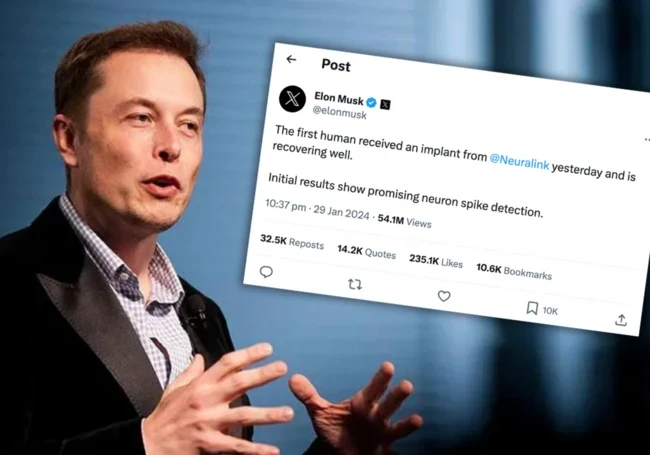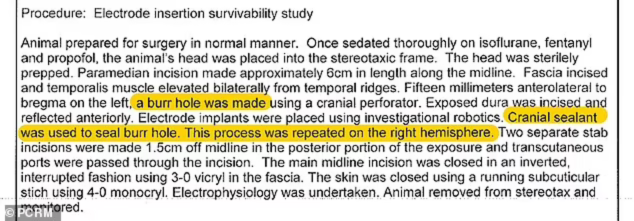The first human with the Neuralink brain chip has seemingly made a full recovery and can now play a virtual game of chess using their thoughts.
Following a controversial history of animals dying during Neuralink’s experiments, the American neurotechnology company has put its first device - ‘Telepathy’ - inside a person’s brain.
Elon Musk, who founded Neuralink in 2016, claims Telepathy will enable the control of almost any device, including everything from your smartphone or computer to a robotic limb.
Musk initially claimed that the first patient could control a computer mouse with his thoughts, though provided no evidence.

However, on March 20th 2024, Neuralink live-streamed the test subject, Noland Arbaugh, seemingly playing chess on his laptop and moving the cursor using the Neuralink device.
— Neuralink (@neuralink) March 20, 2024
What is Neuralink?
Neuralink is an American neurotechnology company that was founded in 2016 by Elon Musk and a team of seven engineers. Neuralink aims to create a brain chip that will allow us to communicate and control computers just by thinking.
Musk proposes the chip could be life-changing, one-day giving paralyzed people the ability to walk again, with the brain-computer interface (BCI) being implanted in the region of the brain responsible for controlling the intention to move.
Read More: Neuralink's First Patient Controls Mouse With Thoughts
How does Neuralink’s brain chip work?
Neuralink works by inputting a computer chip into a person's brain through a series of small threads stitched into the brain.
These threads then connect via electrodes to certain areas of the brain. Neuralink’s electrodes are then able to read neuron signals, which is how the brain communicates with the cells in our body like muscles and nerves. Through these electrodes, brain activity can translate these signals into motor controls.
Is Neuralink safe?
It is unclear if Neuralink is safe. Although the first human patient seems to have made a full recovery the long-term impacts are yet to be determined.
Neuralink is still in its infancy and has primarily been tested on animals. Several successful tests on pigs have been documented, with one even having an implant removed following testing in 2020 and going on to live a healthy life.
The following year, Musk made a public demonstration with a macaque monkey using it’s implanted chip to play a computer game just by thinking.

However, in February 2022, Neuralink confirmed that monkeys had died during its tests. The tech company denies all allegations of animal abuse following a federal probe investigation for violating the Animal Welfare Act after whistleblowing workers estimated 1500 animals perished in the testing process.
Not hugely reassuring then - though Musk did state in 2022 that he’d be comfortable planting a brain chip inside one of his children.

Inside the Minds Shaping AI
Ten visionaries whose research and bets on deep learning and generative models are setting the pace for AI adoption across every sector.
How much will Neuralink cost?
A Neuralink chip is estimated to cost $10,500 (around £8,300) in exams, parts and labour, according to a Bloomberg report. Insurer costs are expected to bump that price up to the $50,000 (£39,000) mark.
When will Neuralink be available?
Neuralink says it plans to perform 11 surgeries in 2024, 27 surgeries in 2025, 79 surgeries in 2026, and 499 surgeries in 2027.
But brain implants are a complex technology, and thorough testing is crucial to ensure safety and understand long-term effects. This process can take several years.
Even after successful trials, Neuralink would need regulatory approval from bodies like the FDA before a wider release.
What does Neuralink do?
Neuralink’s mission aims to allow humans to communicate with computers through the power of thought. A key use case of the Neuralink chip could be giving paralysed people the ability to walk again, though some of the more ambitious goals that Elon Musk has announced include the treatment of obesity, autism, and depression as well as the ability to telepathically communicate.
This raised many about the honesty of claims related to Neuralink’s potential, given that autism is a complex neurodevelopmental disorder and not a disease that can be ‘solved.'
Dubious credibility impacts the real-world adoption of the technology. Despite the promising results reported in the first human test subject, concerns surrounding safety remain top of mind, especially with claims from whistleblower workers that an estimated 1500 animals perished in the initial testing process, prompting a USDA probe.
Would you consider getting a Neuralink chip installed? Let us know in the comments below!







Comments ( 1 )
Anthony Scalzo
05/02/2024